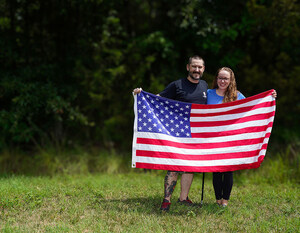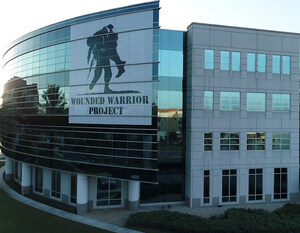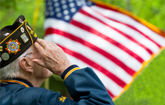Wounded Warrior Project Mental Health Retreat Wins Big
Warriors Band Together in Rehabilitation
JACKSONVILLE, Fla., Sept. 14, 2016 /PRNewswire-USNewswire/ -- For many, it was the first time they stepped out of their homes to engage with their communities. Trepidation swelled in the Florida air as injured warriors began to shuffle through the conference room door. Their quick eyes scanned the room carefully, becoming fully aware of their surroundings: the number of people, unusual objects, hidden areas, and nearest exits. Hypervigilance, isolation, mood swings, and self-medication are a few of the standard warning signs for veterans who live with combat stress.
To date, it is estimated that as many as 400,000 service members live with invisible wounds of war, including combat stress, depression, and finally – the signature wounds of Operation Enduring Freedom (OEF) and Operation Iraqi Freedom (OIF) – post-traumatic stress disorder (PTSD) and traumatic brain injury (TBI). Veterans suffering from these injuries are often forced to endure recalling prompts, typically referred to as triggers, which are linked to situational or emotional experiences and memories from the combat zone. The sound of popcorn popping or fireworks exploding can induce the memory of an improvised explosive device (IED) attack, or a random feeling of anger, sadness, or anxiety can recreate an emotional combat experience.
"Combat stress changed everything about my life," said U.S. Army and Army Reserve combat veteran Edwin Medina from Jacksonville, Florida. "I'm not the same person I was before I deployed. My friends and family would say I used to be easygoing – but that's not me anymore. It's a struggle every day."
In an effort to address the growing mental health needs of warriors returning from war, Wounded Warrior Project® (WWP) created its Combat Stress Recovery Program (CSRP). Through the generous support of donors, CSRP is able to offer veterans a range of specialized programs and services – each tailored to the veteran's specific needs – all free of charge. WWP and its supporters believe warriors already paid their dues on the battlefield, so warriors don't pay for any service they receive.
Frank Poupart-Roldan, a retired U.S. Army combat veteran from Tampa, Florida, recalls the first day of the challenging and transformative mental health retreat in St. Augustine, Florida. "At first, I didn't know what to expect," Frank said. "These people were strangers to me, but there was something familiar. There was a hidden bond that we all understood and didn't need to bring up."
WWP fuses mental health rehabilitation with a military adage: "Leave No Man Behind."
"Reconnecting warriors to each other in the civilian world is very important," said Mike Linnington, WWP chief executive officer. "The peer support that played a critical role on the battlefield has the same function in their recovery at home. In combat, soldiers rely upon each other for survival. It becomes an unyielding trust. When warriors stumble, fall, or become injured, it's the warrior marching next to them that will pick them up and carry them on their shoulder."
"I know what it's like to be alone – to isolate yourself and have no help," Edwin said. "This event changed that for me. I needed this in my life right now. I needed to be with my brotherhood. I know each of those guys will hold me accountable for the goals I set for myself. I know they will call me out if I start falling back. And they will do all of it without judgment."
Frank, Edwin, and the other warriors engaged in three days of challenging outdoor activities that helped them step a little outside of their comfort zone and created an opportunity to confront their high-stress triggers with the goal of understanding them and developing the skills needed to manage them.
"For me, the most challenging part was when we all were surfing at the beach," Frank said. "It wasn't just the physical part. It was mostly having to deal with the crowd – everyone was getting so close to us. But at the same time, it taught me to move past those triggers. This event was important for my recovery. I found myself having so much fun attempting to do something I never would have tried on my own, that I stopped noticing I was in a crowd of people I didn't know. And suddenly I was out of my comfort zone and OK. I think I conquered that."
Exposure to traumatic combat and operational experiences affects service members and veterans spiritually, psychologically, biologically, and socially. A WWP mental health retreat provides a safe, private environment for warriors to express themselves and share their combat experiences – with laughter and tears. At the end of the rehabilitative retreat, the band of warriors shares lessons learned from the activities that impacted their personal struggles most and set achievable goals for their recoveries.
Many leave with new hobbies, battle buddies, and peace of mind.
A rekindled hope.
"There are so many warriors who don't know they need help," Edwin said tearfully. "You got to get up and go!" he exclaimed. "It's gonna change. It's gonna be good for you."
An urgent battle cry.
"Get stepping," Frank said. "You want to get better? There's something here that can be your first step. The worst you can do is nothing."
About Wounded Warrior Project
The mission of Wounded Warrior Project® (WWP) is to honor and empower Wounded Warriors. The WWP purpose is to raise awareness and to enlist the public's aid for the needs of injured service members, to help injured servicemen and women aid and assist each other, and to provide unique, direct programs and services to meet their needs. WWP is a national, nonpartisan organization headquartered in Jacksonville, Florida. To get involved and learn more, visit woundedwarriorproject.org.
Video - https://youtu.be/KWKZkwd0moc
SOURCE Wounded Warrior Project
Related Links
WANT YOUR COMPANY'S NEWS FEATURED ON PRNEWSWIRE.COM?
Newsrooms &
Influencers
Digital Media
Outlets
Journalists
Opted In






Share this article